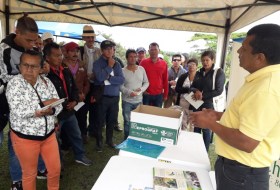News
Unicauca at the Meeting of Community Managers for Water
During the event, processes, advances, criteria and studies that have been developed since 2015, and solutions with alternative or conventional plants and other residual management systems were announced.
With the purpose of establishing ties between the community and community aqueducts, the Meeting of Community Managers for Water, initiative of the Faculty of Agricultural Sciences of the University of Cauca, was held at the facilities of the La Sultana farm in the municipality of Timbío , with the support of the Office of the Vice-Rector for Research through project ID 5011, coordinated by the Social Interaction area of the Innovation, Entrepreneurship and Articulation Division with the Environment -DAE.
The space that had the participation of delegates from the rural aqueducts, public and private institutions, set out to disseminate the processes, advances, criteria and studies that have been developed since 2015 since the Alliance strategy through various stations for Water that includes the University of Cauca through Cicaficultura and Corprocuencas; Currently, it is positioned at the level of the Inter-Institutional Technical Board, made up of institutions such as the Ministry of Environment and Sustainable Development, the Regional Autonomous Corporation of the Cauca CRC, the municipal mayors, CORPROCUENCAS and peasants and indigenous people of the Region.
“The Meeting of Community Managers for Water, is a scenario created for representatives, delegates and rural community, to understand the whole process about the defense of water and the importance of protecting the Own Law for the right to communitary self-management of the water, for this reason, work done for five years to raise awareness, union for water, a close tie between communities that work day by day for the conservation of the water resource ”, said Juan Pablo Paz Concha, teacher of the Faculty of Agricultural Sciences and secretary of the Technical Table Alliance for Water.
From the Division of Innovation, Entrepreneurship and Articulation with the Environment of the Vice Chancellor's Office of Research, of the University of Cauca, the director Juan Carlos Maya Feijoo, expressed the importance of developing strategies, research processes and social interaction for water management and rural aqueducts. "We reaffirm the participation of the academy to promote conditions, to those peasant social organizations that access certain types of technologies and accompaniment, in the face of such a delicate issue in the rural communities of Cauca, such as drinking water."
The day was attended by delegates from rural aqueducts, attached to CORPROCUENCAS, a regional non-profit community entity, defender of the water resource that congregates thirteen aqueducts and an irrigation district with 71,000 users, whose jurisdiction is in the municipalities of Sotará, Timbío and Tambo. Jesús Eimer Meneses, legal representative of the CORPROCUENCAS Corporation, referred to the need to raise concerns in front of the communities, “we want to understand and know the work done by the Corporation and the aqueducts for the environment, we seek an environmental awareness, both in the population and in the public entities that accompany us, but if we don’t manage to have it, it is very complex to continue building a country ”.
The students of the Universidad del Cauca participated with the group of volunteers that are part of the “Water Alliance” project. “These types of spaces are important, because they allow the communities in this case to be approached in rural areas, in order to raise awareness of the importance of appropriating the environmental problems they face daily,” said Julián Andrés Campos del Forest Engineering program, who exhibited through a macro model, the process of strawberry and coffee crops, in addition to the pollution that is generated in the watershed, and the use of agrochemicals.
Likewise, one of the projects executed in the municipality of Sotará was presented, which consists in the implementation of a bio-filter “what is sought is to reduce the coliforms or bacteria that contaminate water and food in rural homes, taking into account says that household waste reaches the water sources with high pollution, it is considered that this is a viable, efficient and economic project, it can also be implemented in rural homes, ”added Vanesa Spain, a student of the Environmental Engineering program.
As a national guest, the National Network of Community Aqueducts of Colombia, an autonomous organization, formed as a national articulation of community aqueducts and as a defense strategy for different socio-environmental problems was present.
“The main element of articulation at the national level is the Law for the right to community self-management of water, which seeks the recognition of three fundamental rights: individual right to excess water, recognized internationally, collective right to water and the right to community self-management of water, that is why we want to demonstrate that it is not enough for the State to regulate the provision of the service from companies or public or private organizations, but also that the community element exists, that it is dimensioned that water is the life and that at the same time goes throughout community and social relations, ”concluded Daniela Ruíz, a member of the Federation of rural community aqueducts in Valle del Cauca.
More Info:
Faculty of Agricultural Sciences


